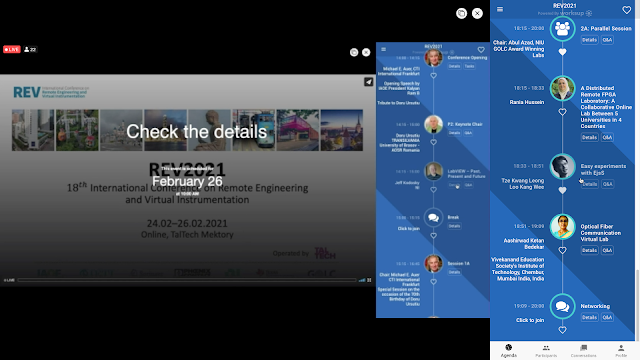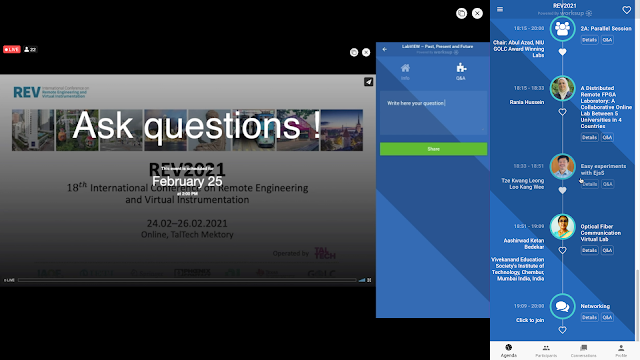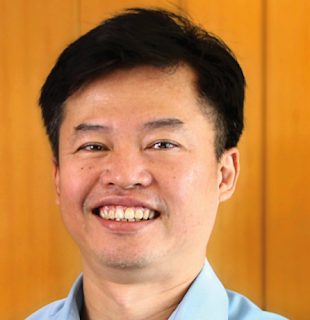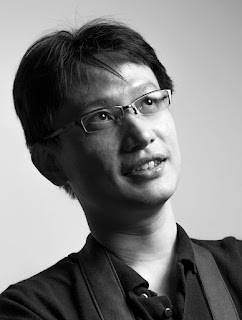1. Overview of REV2021:
The primary purpose of the REV2021 event was to facilitate discussion and showcase advancements in remote engineering and virtual instrumentation, likely within an educational context. The event was held online using the WORKSUP platform. The main landing page for the event was:
- WORKSUP Event Link: https://worksup.com/app#id=REV2021
The event included various sessions, including talks and workshops, as indicated by the "Events/Workshop/Talks" breadcrumb.
2. Key Themes and Important Ideas:
- Open Educational Resources (OER) and Open Source Physics: The event was hosted under the umbrella of "Open Educational Resources / Open Source Physics @ Singapore," highlighting a strong emphasis on freely accessible and modifiable educational materials and tools in physics and engineering.
- Remote and Virtual Labs: The core focus was on the application and development of remote engineering and virtual instrumentation, likely driven by the need for accessible and flexible learning experiences, potentially exacerbated by the pandemic context of 2021.
- GOLC Online Lab Award: A significant part of the event was dedicated to the "GOLC Award Winning Labs." Session 2A, held on Thursday, February 25th, 2021 (6:15pm - 8:00pm Conference Time), featured presentations related to this award. The session chair was Abul Azad from NIU.
- The abstract for the "GOLC Award Winning Labs" session suggests a focus on showcasing innovative and effective online laboratory setups.
- Variety of Lab Types: The presentations in Session 2A highlight different approaches to online labs:
- Remote Controlled Experiment: ID 122 presented a "Distributed Remote FPGA Laboratory: A Collaborative Online Lab Between 5 Universities in 4 Countries." This emphasizes the potential for complex, hands-on experiments controlled remotely across geographical boundaries.
- Visualized Experiment: ID 104 showcased "Easy experiments with EjsS," indicating the use of the Easy JavaScript/Java Simulations (EjsS) Toolkit for creating visually engaging experiments. The presenters were affiliated with the Universidad de Murcia (Spain) and the Ministry of Education, Singapore. This aligns with the "Open Source Physics @ Singapore" context.
- Simulated Experiment: ID 106 presented an "Optical Fiber Communication Virtual Lab," demonstrating the use of simulations to model complex engineering systems. The presenters were from Vivekanand Education Society's Institute of Technology, Chembur, Mumbai, India.
- Importance of EjsS (Easy JavaScript/Java Simulations Toolkit): The mention of "Easy experiments with EjsS" and the later reference to the "Easy Java/JavaScript Simulations Toolkit" (https://www.um.es/fem/EjsWiki/) indicate the significance of this open-source tool in the creation of interactive and visualized experiments within this community. The toolkit is attributed to Francisco Esquembre and Félix Jesús Garcia Clemente.
- Presentation Guidelines for Virtual Conference: Instructions were provided for presenters, reflecting the online nature of the event:
- Duration: Full papers were allotted 15 minutes for presentation and 3 minutes for Q&A. Short and Work in Progress papers had 10 minutes for presentation and 3 minutes for Q&A.
- Platform: The conference utilized the WORKSUP platform.
- Presentation Options: Authors had the option to deliver live presentations or submit pre-recorded presentations. Pre-recording was "highly recommend[ed]," and the REV2021 technical team offered to assist with this process via Zoom. The deadline for pre-recordings was February 22, 2021.
- Presentation Template: A PowerPoint (ppt) template was provided for presentations.
- Video Call Reminders: Guidelines were shared for successful video calls, emphasizing aspects like audio and video quality.
- Portrait Photo: Authors were requested to upload a portrait photo for use on the Worksup platform.
- Q&A via Zoom: Separate Zoom links were to be used for the Q&A sessions. Presenters who pre-recorded were instructed to join Zoom only during their Q&A time and mute or close the Worksup browser video beforehand.
- Showcasing a Wide Range of Interactive Educational Resources: The extensive list under the "accordionfaq" section reveals a diverse collection of HTML5 JavaScript simulation applets and other interactive tools developed and shared within this community. These cover a broad spectrum of topics in physics, chemistry, mathematics, and even language learning. Examples include simulations of:
- Mechanics (SHM, projectile motion, forces)
- Electromagnetism (electromagnets, magnetic fields)
- Thermodynamics (heat transfer, kinetic theory of gases)
- Optics (polarization, diffraction)
- Chemistry (bonding, organic molecules)
- Mathematics (geometry, algebra)
- Interactive games for learning various subjects.
- Tools for teachers (e.g., e-assessment design).
- Community and Collaboration: The involvement of multiple universities across different countries in the "Distributed Remote FPGA Laboratory" project, as well as the diverse affiliations of the presenters and the wide range of contributors to the interactive resources, suggests a strong sense of community and collaboration within the OER and open-source physics education space.
- Recognition of Contributions: The mention of the "GOLC Award Winning Labs" and the "2020 Excellence in Physics Education Award from American Physical Society goes to Open Source Physics Team" indicate a recognition and celebration of the work being done in this field.
3. Notable Quotes:
- Regarding pre-recorded presentations: "We highly recommend pre-recording your presentation, which will be done by the REV2021 technical team."
- Instruction for authors with pre-recorded presentations: "Please note that those authors who have pre-recorded their presentations do not have to upload ppt and ppts files!"
- The description of the distributed remote FPGA laboratory: "A Distributed Remote FPGA Laboratory: A Collaborative Online Lab Between 5 Universities in 4 Countries."
- The description of the EjsS presentation: "Easy experiments with EjsS."
4. Further Observations:
- The blog-like format of the initial source suggests a community-driven effort to share information and resources related to the event and the broader OER/open-source physics movement.
- The numerous links provided indicate a reliance on various online platforms for event management (WORKSUP, ConfTool), document sharing (Google Docs, SharePoint), and resource hosting.
- The "Popular Tags" section reveals some of the common themes and topics of interest within this community.
5. Conclusion:
The REV2021 workshop on Remote Engineering and Virtual Instrumentation was a significant online event that brought together educators and developers interested in leveraging open educational resources and open-source tools, particularly the EjsS toolkit, to create innovative and accessible learning experiences. The focus on remote and virtual labs, highlighted by the GOLC Award Winning Labs session, underscores the growing importance of these approaches in engineering and science education. The extensive collection of shared interactive resources demonstrates a vibrant and collaborative community dedicated to advancing teaching and learning through freely available and adaptable materials.
Study Guide: REV2021 Workshop on Remote Engineering and Virtual Instrumentation
Overview
This study guide is designed to help you review the material related to the "20210224-26 Remote engineering and virtual instrumentation REV2021" online workshop. It covers key information about the event, presentations, and related resources.
Quiz
Answer the following questions briefly in 2-3 sentences each.
- What was the primary focus of the REV2021 workshop held on February 24-26, 2021?
- According to the source, what platform was used to host the REV2021 virtual conference?
- What were the recommended presentation durations for full papers and short/work-in-progress papers at REV2021?
- What were the two options available for authors to deliver their presentations at the REV2021 workshop? Briefly describe each.
- What was the deadline mentioned for authors to pre-record their presentations for REV2021?
- What is the GOLC Award mentioned in the context of the REV2021 workshop?
- Name at least two of the winning lab proposals presented during the "GOLC Award Winning Labs" session.
- Who was the chair of the "GOLC Award Winning Labs" parallel session during the REV2021 conference?
- What is the "Easy JavaScript/JavaScript Simulations Toolkit" (EjsS) mentioned in the context of the workshop?
- What is the license under which the contents of the "Open Educational Resources / Open Source Physics @ Singapore" website are licensed?
Quiz Answer Key
- The primary focus of the REV2021 workshop was on remote engineering and virtual instrumentation, as indicated by the workshop's title. It aimed to bring together individuals interested in these areas.
- The REV2021 virtual conference was hosted on the virtual event platform called WORKSUP, as explicitly stated in the instructions for virtual presentations.
- For REV2021, the recommended presentation duration for full papers was 15 minutes plus 3 minutes for Q&A, while short papers and work-in-progress papers were allocated 10 minutes plus 3 minutes for Q&A.
- The two presentation options for authors were: 1) Pre-recorded presentation, which was highly recommended and handled by the REV2021 technical team via Zoom, and 2) potentially a live presentation during the session, although pre-recording was favored.
- The deadline for authors to submit their requests for pre-recording their presentations for the REV2021 workshop was February 22, 2021.
- The GOLC Award, as mentioned in the context of the REV2021 workshop, is an "Online Lab Award" for which proposals were submitted and winning labs were presented during a specific session.
- Two of the winning lab proposals presented were "A Distributed Remote FPGA Laboratory: A Collaborative Online Lab Between 5 Universities in 4 Countries" and "Easy experiments with EjsS."
- The chair of the "GOLC Award Winning Labs" parallel session during the REV2021 conference was Abul Azad from NIU.
- The "Easy JavaScript/JavaScript Simulations Toolkit" (EjsS) is a toolkit mentioned in the context of visualized experiments and is associated with Francisco Esquembre and Félix Jesús Garcia Clemente. It appears to be a tool for creating interactive simulations.
- The contents of the "Open Educational Resources / Open Source Physics @ Singapore" website are licensed under the Creative Commons Attribution-Share Alike 4.0 Singapore License.
Essay Format Questions
Consider the following questions for a more in-depth analysis.
- Discuss the significance of remote engineering and virtual instrumentation in contemporary education and research, drawing upon the context of the REV2021 workshop.
- Analyze the benefits and potential challenges of using virtual event platforms like WORKSUP for hosting international workshops and conferences, as experienced by REV2021.
- Evaluate the approach taken by REV2021 regarding presentation formats (pre-recorded vs. live) and discuss the rationale behind recommending pre-recorded presentations.
- Based on the provided information, explore the role and impact of open educational resources and open-source tools (such as EjsS) in the field of remote engineering and virtual experimentation.
- Reflect on the diversity of topics and projects listed under the "accordionfaq" section and discuss how they relate to the broader themes of open educational resources, virtual learning, and interactive simulations.
Glossary of Key Terms
- Remote Engineering: The operation and control of engineering systems or experiments from a geographically distant location, often utilizing internet connectivity.
- Virtual Instrumentation: The use of software and computer interfaces to emulate the functionality of traditional hardware instruments, allowing for flexible and often more cost-effective experimentation and measurement.
- Online Workshop/Conference: An event conducted over the internet, enabling participants from various locations to interact, share information, and learn remotely.
- Open Educational Resources (OER): Teaching, learning, and research materials that are available freely online for anyone to use, adapt, and share, often under specific licenses.
- Open Source Physics (OSP): A project focused on creating and disseminating free and open-source computational tools and resources for physics education.
- WORKSUP: The specific virtual event platform used to host the REV2021 online workshop, facilitating presentations, discussions, and access to event information.
- GOLC Award: An "Online Lab Award" associated with the REV2021 workshop, recognizing innovative and effective online laboratory experiences.
- EjsS (Easy JavaScript/JavaScript Simulations Toolkit): A software toolkit that enables the creation of interactive simulations using JavaScript, often used for educational purposes in science and engineering.
- Pre-recorded Presentation: A presentation that is recorded in advance of a live event and then played for attendees, often used in virtual conferences to ensure smooth delivery and manage technical issues.
- Parallel Session: A session within a larger conference or workshop where multiple presentations or activities occur simultaneously in different virtual rooms or channels.
WORKSUP https://mektory.smai.ly/r?oid=11702&mid=2SGSSH5rb&lid=nncBcApd&url=https%3A%2F%2Fwww.worksup.com%2F&s=eab28f11b12820d0c398c9e9f7fecade05cf6cf6a680df5da1c0dadf3494248a"}">https://www.worksup.com/
Event ID: REV2021
Direct link to the conference: https://mektory.smai.ly/r?oid=11702&mid=2SGSSH5rb&lid=zoeApzcp&url=https%3A%2F%2Fworksup.com%2Fapp%23id%3DREV2021&s=fe0cb2476e2dff203f18bbe0cc80c1852f1431464b2e27c5a5fd303dc32332a3"}">https://worksup.com/app#id=REV2021
|
Direct link to the conference: https://mektory.smai.ly/r?oid=11702&mid=2SGSSH5rb&lid=zoeApzcp&url=https%3A%2F%2Fworksup.com%2Fapp%23id%3DREV2021&s=fe0cb2476e2dff203f18bbe0cc80c1852f1431464b2e27c5a5fd303dc32332a3","style":""}">https://worksup.com/app#id=REV2021 |
|
Direct link to the conference: https://mektory.smai.ly/r?oid=11702&mid=2SGSSH5rb&lid=zoeApzcp&url=https%3A%2F%2Fworksup.com%2Fapp%23id%3DREV2021&s=fe0cb2476e2dff203f18bbe0cc80c1852f1431464b2e27c5a5fd303dc32332a3","style":""}">https://worksup.com/app#id=REV2021 |
Easy experiments with EjsS GOLC 2021 Online Lab Award Visualized experiment REV_presentation
https://docs.google.com/presentation/d/e/2PACX-1vSfLWt2vvqXdmLbcOhOj96rKeBj3PfHHx53qzW2PwKo7i272HF81tIq3Zcl1URfng/pub?start=false&loop=false&delayms=3000"}">https://docs.google.com/presentation/d/e/2PACX-1vSfLWt2vvqXdmLbcOhOj96rKeBj3PfHHx53qzW2PwKo7i272HF81tIq3Zcl1URfng/pub?start=false&loop=false&delayms=3000
https://www.conftool.com/rev-conference/index.php?page=browseSessions&form_session=315"}">2A: Parallel Session
REV2021 February 24–26, 2021
Conference Time:
Thursday, 25/Feb/2021:
6:15pm - 8:00pm
Session Time in Your Local Time Zone: Friday, 26/Feb/2021: 12:15am - 2:00am
Session Chair: Abul Azad, NIU; This email address is being protected from spambots. You need JavaScript enabled to view it.";}">This email address is being protected from spambots. You need JavaScript enabled to view it.
GOLC Award Winning Labs
 https://docs.google.com/presentation/d/e/2PACX-1vSfLWt2vvqXdmLbcOhOj96rKeBj3PfHHx53qzW2PwKo7i272HF81tIq3Zcl1URfng/embed?start=false&loop=false&delayms=3000" webkitallowfullscreen="true" width="1280"></iframe>" />
https://docs.google.com/presentation/d/e/2PACX-1vSfLWt2vvqXdmLbcOhOj96rKeBj3PfHHx53qzW2PwKo7i272HF81tIq3Zcl1URfng/embed?start=false&loop=false&delayms=3000" webkitallowfullscreen="true" width="1280"></iframe>" />
https://1.bp.blogspot.com/-m7t2tUd6xgw/YDNbXn0a0ZI/AAAAAAABPGM/WNbNCdVQIZAzkKknZGe7BqjemaVMuod6ACLcBGAsYHQ/s720/Slide1.png","style":""}">
https://1.bp.blogspot.com/-YeDKRZjWv3E/YDNbaNJiqnI/AAAAAAABPGs/M6L4QFY26xYi-RIqBU-11hTKgp4SubYlgCLcBGAsYHQ/s720/Slide2.png","style":""}">
https://1.bp.blogspot.com/-BnbhKUthIh0/YDNbaUeq3dI/AAAAAAABPGw/7m184DBwDscUZkz6PJkuTQpV86qOzvQQQCLcBGAsYHQ/s720/Slide3.png","style":""}">
https://1.bp.blogspot.com/-vSZUgl4ASAc/YDNbaiWhctI/AAAAAAABPG0/UeRoeCbWSXkLb4mx5fT8-Krgj8bD8Tg1wCLcBGAsYHQ/s720/Slide4.png","style":""}">
https://1.bp.blogspot.com/-9z3ULvyXrNk/YDNbayKzD_I/AAAAAAABPG4/GuwYYa2yni4qzY1WWDSrXy9LKUd3YHcZACLcBGAsYHQ/s720/Slide5.png","style":""}">

https://1.bp.blogspot.com/-8tlx4CNicXs/YDNbbHEAjSI/AAAAAAABPG8/ETqDrpZjhvgpQsQqzgRCKpqru4tnkyXsgCLcBGAsYHQ/s720/Slide6.png","style":""}">
https://1.bp.blogspot.com/-m5PEkKfXZ30/YDNbbcl4dpI/AAAAAAABPHA/Cb3zjfRkZU4ZBkq92y5X0mZMfF2IgnNuQCLcBGAsYHQ/s720/Slide7.png","style":""}">
https://1.bp.blogspot.com/-osJpTZC9uIk/YDNbbv-HnzI/AAAAAAABPHE/CE9XvomcEfI7m3uK2vE0PFLVd9gFf_OCgCLcBGAsYHQ/s720/Slide8.png","style":""}">
Frequently Asked Questions about REV2021 and Related Themes
1. What was the main focus of the REV2021 WORKSHOP?
The REV2021 WORKSHOP, held online from February 24-26, 2021, focused on Remote Engineering and Virtual Instrumentation. This encompassed the use of online platforms and simulated or remotely accessible laboratory setups for engineering education and experimentation.
2. What platform was primarily used for the REV2021 online conference?
The virtual event platform used for the REV2021 conference was WORKSUP. Participants were provided with an event ID to access the conference through the WORKSUP website or app.
3. How were presentations delivered at REV2021?
Authors had two main options for delivering their presentations: pre-recorded presentations and potentially live presentations (though pre-recording was highly recommended). For pre-recorded presentations, authors were asked to schedule a recording time with the technical team via Zoom and use a provided PowerPoint template.
4. What was the duration allotted for presentations at REV2021?
The duration for presentations depended on the type of paper. Full paper presentations were allotted 15 minutes plus 3 minutes for Q&A. Short papers and Work in Progress papers had 10 minutes for presentation followed by 3 minutes for Q&A.
5. What was the GOLC Award mentioned in the context of REV2021?
The GOLC Award mentioned refers to the Global Online Laboratory Consortium Award. A parallel session at REV2021 was dedicated to presentations that were proposals for this award, showcasing innovative online laboratory experiments.
6. What types of online lab experiments were presented as proposals for the GOLC 2021 Online Lab Award?
The presentations in the "GOLC Award Winning Labs" session included diverse types of online experiments, such as a remote-controlled experiment, a visualized experiment utilizing EjsS (Easy JavaScript/JavaScript Simulations), and a simulated experiment focusing on Optical Fiber Communication. There was also a proposal for a distributed remote FPGA laboratory involving collaboration between multiple universities.
7. What is EjsS and why is it significant in the context of these sources?
EjsS (Easy JavaScript/JavaScript Simulations) is an open-source tool mentioned in the context of creating "easy experiments" and was highlighted in one of the GOLC Award proposals. It is a significant tool for developing interactive simulations and virtual experiments, making it relevant to the theme of remote engineering and virtual instrumentation. The sources also mention Francisco Esquembre and Félix Jesús Garcia Clemente as being associated with EjsS.
8. Beyond the conference itself, what broader themes related to online education and open educational resources are evident in the provided information?
The sources highlight several broader themes, including the use of open educational resources (OER), the development and sharing of interactive simulations and applets (many created using JavaScript and HTML5), and the application of these resources across various subjects (physics, chemistry, mathematics, etc.) and educational levels (primary school to university). The mention of the "Open Source Physics @ Singapore" initiative and the listing of numerous interactive tools and games indicate a strong emphasis on accessible, engaging, and technology-enhanced learning experiences.

https://1.bp.blogspot.com/-YCJhFbzCJ6I/YDNbbqnenzI/AAAAAAABPHI/SvaLPMuAgsEU77vDsxD4qBF4L9KwnlqGgCLcBGAsYHQ/s720/Slide9.png","style":""}">
https://1.bp.blogspot.com/-mGlL_xRqv20/YDNbXqFo7VI/AAAAAAABPGE/-7oAohLMwO45mV4MSFg-5WsXAhJcFomJwCLcBGAsYHQ/s720/Slide10.png","style":""}">
https://1.bp.blogspot.com/-3sxl5PBRIu8/YDNbXgf6o4I/AAAAAAABPGI/mXmUDRyqoZ0PeXF_p2AHoFbuQMyC7qnHgCLcBGAsYHQ/s720/Slide11.png","style":""}">
https://1.bp.blogspot.com/-hJVuo1-1E4w/YDNbYdvbYrI/AAAAAAABPGQ/LEb3qnzg7pYAN3sF7PIny36tH7O5j1c5ACLcBGAsYHQ/s720/Slide12.png","style":""}">
https://1.bp.blogspot.com/-n31bip43RlA/YDNbYklyaoI/AAAAAAABPGU/Bv7ccXQMvC4BhgLQ9vmYCY2CzA6UZXuyQCLcBGAsYHQ/s720/Slide13.png","style":""}">
https://1.bp.blogspot.com/-xeU0wHbOXkU/YDNbYs73-iI/AAAAAAABPGY/t4d0uWmxWfARlqt9LYwvwEVyHOsnp14kACLcBGAsYHQ/s720/Slide14.png","style":""}">
https://1.bp.blogspot.com/-tNdHG5lB_Y8/YDNbZHhpuUI/AAAAAAABPGc/1M4z0X_Hickc29mR3NuueA44jkftgHxqgCLcBGAsYHQ/s720/Slide15.png","style":""}">
https://1.bp.blogspot.com/-GxHPqrnCEK0/YDNbZdiCF5I/AAAAAAABPGg/NecgrcAru0kgSB4DXj1OYeqMVQr8Jt6JACLcBGAsYHQ/s720/Slide16.png","style":""}">
https://1.bp.blogspot.com/-y8Ik62_iMmc/YDNbZpNcz3I/AAAAAAABPGk/W8Et6FgxgrwCMIivFPUcKNtq6DKs5xv3gCLcBGAsYHQ/s720/Slide17.png","style":""}">
https://1.bp.blogspot.com/-mkl4wTQ6SzA/YDNbZ9slAhI/AAAAAAABPGo/4ewyfuzfoXwY6KS6Gjm-8aSbfEDmmvVUACLcBGAsYHQ/s720/Slide18.png","style":""}">
Instructions for REV2021 virtual presentations
Duration of Full Paper: 15 minutes for presentation + 3 minutes for Q&A.
Duration of Short Paper and Work in Progress paper: 10 minutes for presentation + 3 minutes for Q&A.
The conference will take place on the virtual event platform WORKSUP https://mektory.smai.ly/r?oid=11702&mid=ADV1MH5rb&lid=nncBcApd&url=https%3A%2F%2Fwww.worksup.com%2F&s=a13020dad319c79b229a33618ab90b7dbdc0aed30f128770bcb5cc02a36eebc5"}">https://www.worksup.com. Event ID will be sent to all authors and participants 2 days before the conference.
For authors there are two choices to make a presentation:
1. Pre-recorded presentation
We highly recommend pre-recording your presentation, which will be done by the REV2021 technical team.
For pre-recorded presentation the following steps are necessary:
Please write an email to This email address is being protected from spambots. You need JavaScript enabled to view it.";}">This email address is being protected from spambots. You need JavaScript enabled to view it. where you tell us your preferred pre-recording time. If your preferred time is suitable then we will send you a Zoom link for the pre-recording. The deadline for pre-recordings is 22 February 2021.
Please use the https://mektory.smai.ly/r?oid=11702&mid=ADV1MH5rb&lid=1oac9pen&url=https%3A%2F%2Flivettu.sharepoint.com%2F%3Ap%3A%2Fs%2Fkonverentsikeskus_mektory%2FEdhHXtwuYkhKpFtDGfDqwYwBwhXfvOEF943WmN1PmIJUfQ%3Fe%3DZCBXO7&s=04863a46c180799b3baddf58efa3f84b97ee62882befc742952047adb328ca24"}">ppt template for your presentation.
Please follow the https://mektory.smai.ly/r?oid=11702&mid=ADV1MH5rb&lid=dbdqBp1d&url=https%3A%2F%2Flivettu.sharepoint.com%2Fsites%2Fkonverentsikeskus_mektory%2FShared%2520Documents%2F2021%2520konverentsid%2FREV2021%2FInstructions_REV2021%2FReminders-for-a-successful-video-call.pdf&s=f916e8dcf618bd67b6b0718428ea947b9c5db3925cf3210afe7bdae2ea012991"}">reminders for a successful video call.
· Please upload your portrait photo to the https://mektory.smai.ly/r?oid=11702&mid=ADV1MH5rb&lid=dpccepoc&url=https%3A%2F%2Fwww.dropbox.com%2Frequest%2Fn40xSYmFrtbFD1P3XvJc&s=471e57fa5eded5afa65f7c2c1f9d183cfb650f5fe5b7cbf5e0039264f4d8c562"}">following link and name the photo file with your name and surname. We will upload your photo to the Worksup.
For Q&A we will send you a Zoom link. Please join Zoom only for your Q&A time and during your presentation. Please mute or close the Worksup browser video before joining the Zoom session.
Please note that those authors who have pre-recorded their presentations do not have to upload ppt and ppts files!
https://www.conftool.com/rev-conference/index.php?page=browseSessions&form_session=315&metadata=show&presentations="}">https://www.conftool.com/rev-conference/index.php?page=browseSessions&form_session=315&metadata=show&presentations=show
Frequently Asked Questions about REV2021 and Related Themes
1. What was the main focus of the REV2021 WORKSHOP?
The REV2021 WORKSHOP, held online from February 24-26, 2021, focused on Remote Engineering and Virtual Instrumentation. This encompassed the use of online platforms and simulated or remotely accessible laboratory setups for engineering education and experimentation.
2. What platform was primarily used for the REV2021 online conference?
The virtual event platform used for the REV2021 conference was WORKSUP. Participants were provided with an event ID to access the conference through the WORKSUP website or app.
3. How were presentations delivered at REV2021?
Authors had two main options for delivering their presentations: pre-recorded presentations and potentially live presentations (though pre-recording was highly recommended). For pre-recorded presentations, authors were asked to schedule a recording time with the technical team via Zoom and use a provided PowerPoint template.
4. What was the duration allotted for presentations at REV2021?
The duration for presentations depended on the type of paper. Full paper presentations were allotted 15 minutes plus 3 minutes for Q&A. Short papers and Work in Progress papers had 10 minutes for presentation followed by 3 minutes for Q&A.
5. What was the GOLC Award mentioned in the context of REV2021?
The GOLC Award mentioned refers to the Global Online Laboratory Consortium Award. A parallel session at REV2021 was dedicated to presentations that were proposals for this award, showcasing innovative online laboratory experiments.
6. What types of online lab experiments were presented as proposals for the GOLC 2021 Online Lab Award?
The presentations in the "GOLC Award Winning Labs" session included diverse types of online experiments, such as a remote-controlled experiment, a visualized experiment utilizing EjsS (Easy JavaScript/JavaScript Simulations), and a simulated experiment focusing on Optical Fiber Communication. There was also a proposal for a distributed remote FPGA laboratory involving collaboration between multiple universities.
7. What is EjsS and why is it significant in the context of these sources?
EjsS (Easy JavaScript/JavaScript Simulations) is an open-source tool mentioned in the context of creating "easy experiments" and was highlighted in one of the GOLC Award proposals. It is a significant tool for developing interactive simulations and virtual experiments, making it relevant to the theme of remote engineering and virtual instrumentation. The sources also mention Francisco Esquembre and Félix Jesús Garcia Clemente as being associated with EjsS.
8. Beyond the conference itself, what broader themes related to online education and open educational resources are evident in the provided information?
The sources highlight several broader themes, including the use of open educational resources (OER), the development and sharing of interactive simulations and applets (many created using JavaScript and HTML5), and the application of these resources across various subjects (physics, chemistry, mathematics, etc.) and educational levels (primary school to university). The mention of the "Open Source Physics @ Singapore" initiative and the listing of numerous interactive tools and games indicate a strong emphasis on accessible, engaging, and technology-enhanced learning experiences.




